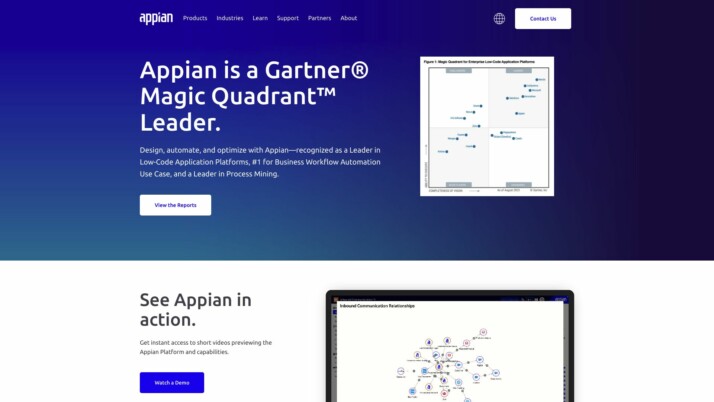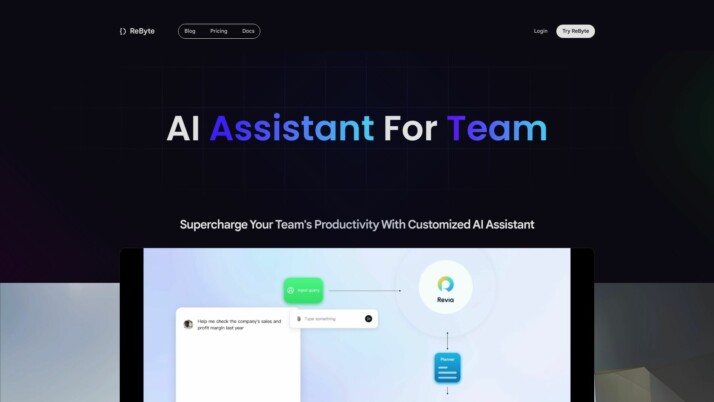Appian vs. Rebyte: AI Platforms Compared for Enterprise and Rapid Development
AI-powered software platforms are transforming how businesses operate, automate processes, and deliver value. This comparison examines Appian vs. Rebyte, and SmythOS — three leading platforms empowering organizations to harness AI capabilities. We’ll explore how each platform approaches AI integration, application development, and deployment to help you determine the best fit for your needs. Whether you’re a developer seeking advanced customization, a business leader focused on enterprise-grade solutions, or a non-technical user looking to leverage AI, this analysis will equip you with key insights to make an informed decision in selecting an AI platform.
Appian Overview
Appian delivers a comprehensive low-code platform for building and deploying AI-powered applications. The platform empowers both technical and non-technical users to create intelligent automation solutions without extensive coding knowledge.


Appian’s AI capabilities focus on enhancing business processes through seamless integration of artificial intelligence into existing workflows. The platform offers pre-built AI skills for document processing, email classification, and data extraction, allowing organizations to quickly implement AI-driven automation. Appian’s low-code approach democratizes AI development, enabling a wider range of users to create and deploy intelligent applications.
Appian’s low-code approach democratizes AI development, enabling a wider range of users to create and deploy intelligent applications.
Key features of Appian’s AI offering include visual design tools for creating custom AI models, integration with external AI services like OpenAI, and built-in security measures to ensure data privacy. The platform supports both development and production environments, allowing teams to iterate on AI solutions before deploying them at scale. Appian also provides an Enterprise Copilot feature, leveraging generative AI to provide instant answers from curated business documents.
While Appian excels in process automation and AI integration, it lacks some advanced AI agent capabilities found in specialized platforms. The platform doesn’t offer features like autonomous multi-agent collaboration or sophisticated memory and context management for AI agents. Additionally, Appian’s focus on enterprise workflows may limit its appeal for users seeking more general-purpose AI development tools.
Appian positions itself as a leader in intelligent automation for enterprises, competing with other low-code platforms and specialized AI tools. Its strength lies in combining AI capabilities with robust process management features, making it particularly attractive for organizations looking to enhance their existing business processes with artificial intelligence.
Rebyte Overview
Rebyte empowers users to rapidly develop AI-powered applications without extensive coding skills. The platform’s visual agent builder allows creation of customizable AI agents with multi-step workflows using large language models. Users can construct complex backend logic and fully customized user interfaces without writing code.


Rebyte’s serverless runtime handles hosting, orchestration, testing, and production deployment of AI agents. The platform integrates with private data sources and provides detailed observability into each step of an agent’s operation. This end-to-end lifecycle management enables knowledge workers and teams to automate workflows and boost productivity through no-code AI development.
Rebyte empowers users to rapidly develop AI-powered applications without extensive coding skills. The platform’s visual agent builder allows creation of customizable AI agents with multi-step workflows using large language models.
Key differentiators include Rebyte’s visual builder, integrated runtime, and focus on end-user AI application development. The platform aims to democratize AI by allowing users to go from concept to deployed application simply by describing their requirements. However, Rebyte currently lacks some advanced features like multi-agent collaboration, constrained alignment, and deployment options like webhooks or scheduled agents.
While Rebyte offers a compelling solution for rapid AI application development, users should consider their specific needs around scalability, integration capabilities, and advanced AI functionalities when evaluating the platform against alternatives. The emphasis on visual building and no-code development makes Rebyte particularly suitable for business users and teams looking to leverage AI without deep technical expertise.
Feature Comparison
Appian and Rebyte offer distinct approaches to AI integration and application development, each with its own strengths and limitations. Appian excels in process automation and enterprise-grade AI integration, while Rebyte focuses on rapid AI application development with a no-code approach.
Appian’s strength lies in its comprehensive low-code platform that combines AI capabilities with robust process management features. It provides pre-built AI skills for document processing, email classification, and data extraction, making it particularly attractive for organizations looking to enhance existing business processes. Appian also offers Enterprise Copilot, leveraging generative AI for instant answers from curated business documents. However, Appian lacks some advanced AI agent capabilities like autonomous multi-agent collaboration and sophisticated memory management for AI agents.
Rebyte, on the other hand, emphasizes rapid AI application development without extensive coding. Its visual agent builder allows users to create customizable AI agents with multi-step workflows using large language models. Rebyte’s serverless runtime handles hosting, orchestration, and deployment, enabling quick transitions from concept to deployed application. However, Rebyte currently lacks some advanced features like multi-agent collaboration, constrained alignment, and deployment options such as webhooks or scheduled agents.
In terms of core components, Appian provides a more comprehensive suite of tools for enterprise workflows, including robust process automation and integration with existing systems. Rebyte offers a more streamlined approach focused on AI agent development and deployment. Both platforms support visual builders and no-code options, but Rebyte’s emphasis on end-user AI application development may make it more accessible for non-technical users.
Regarding security, Appian emphasizes data privacy and security, implying strong data encryption practices and API authentication. Rebyte’s security features are less prominently highlighted in the available information. For organizations with stringent security requirements, Appian’s enterprise-focused approach may provide more comprehensive security measures.
We believe SmythOS offers the best of both worlds, combining the enterprise-grade features of Appian with the rapid development capabilities of Rebyte, while also providing advanced AI agent functionalities that neither platform fully addresses.
Feature Comparison Table
| Appian | Rebyte | SmythOS | |
|---|---|---|---|
| CORE FEATURES | |||
| Hosted Agents (Dev, Production) | ❌ | ✅ | ✅ |
| Autonomous Agents | ❌ | ❌ | ✅ |
| Multimodal | ✅ | ❌ | ✅ |
| Multi-Agent Collaboration | ❌ | ❌ | ✅ |
| Agent Work Scheduler | ❌ | ✅ | ✅ |
| SECURITY | |||
| Constrained Alignment | ✅ | ❌ | ✅ |
| Data Encryption | ✅ | ❌ | ✅ |
| OAuth | ✅ | ❌ | ✅ |
| IP Control | ✅ | ❌ | ✅ |
| COMPONENTS | |||
| Foundation AIs | ❌ | ✅ | ✅ |
| Huggingface AIs | ❌ | ❌ | ✅ |
| Zapier APIs | ❌ | ✅ | ✅ |
| Classifiers | ✅ | ❌ | ✅ |
| Logic | ✅ | ❌ | ✅ |
| Data Lakes | ✅ | ❌ | ✅ |
| DEPLOYMENT OPTIONS (EMBODIMENTS) | |||
| Deploy as Webhook | ✅ | ❌ | ✅ |
| Staging Domains | ✅ | ❌ | ✅ |
| Production Domains | ✅ | ❌ | ✅ |
| API Authentication (OAuth + Key) | ✅ | ❌ | ✅ |
| Deploy as Site Chat | ❌ | ✅ | ✅ |
| Deploy as Scheduled Agent | ❌ | ❌ | ✅ |
| Deploy as GPT | ❌ | ✅ | ✅ |
| DATA LAKE SUPPORT | |||
| Hosted Vector Database | ❌ | ✅ | ✅ |
| Sitemap Crawler | ❌ | ❌ | ✅ |
| YouTube Transcript Crawler | ❌ | ❌ | ✅ |
| URL Crawler | ❌ | ❌ | ✅ |
Best Alternative to Appian and Rebyte
SmythOS stands out as the superior alternative to Appian and Rebyte, offering a comprehensive AI agent development platform that combines powerful features with unmatched ease of use. Our solution addresses the limitations of both competitors while providing a robust ecosystem for creating and deploying AI agents across various use cases.
Unlike Appian’s focus on process automation and Rebyte’s emphasis on rapid application development, SmythOS delivers a versatile platform that excels in both areas. We enable users to create sophisticated AI agents using our intuitive drag-and-drop interface, eliminating the need for extensive coding knowledge. This approach democratizes AI development, making it accessible to both technical and non-technical users alike.
SmythOS shines in its ability to support autonomous agents and multi-agent collaboration, features notably absent in both Appian and Rebyte.
SmythOS shines in its ability to support autonomous agents and multi-agent collaboration, features notably absent in both Appian and Rebyte. Our platform allows for the creation of AI agents that can work independently or in teams, tackling complex tasks with minimal human intervention. This capability opens up new possibilities for automation and problem-solving across industries.
Security and scalability are paramount in SmythOS. We offer enterprise-grade features such as data encryption, OAuth integration, and IP control, ensuring that your AI agents operate in a secure environment. Our platform scales effortlessly to meet growing demands, supporting everything from small-scale prototypes to large-scale production deployments.
With SmythOS, users gain access to a wide array of deployment options and integrations. Whether you need to deploy your AI agents as APIs, webhooks, chatbots, or scheduled tasks, our platform provides the flexibility to meet your specific requirements. We support integration with popular AI models, APIs, and data sources, allowing you to leverage the full potential of AI in your projects.
Conclusion
Appian and Rebyte offer compelling solutions for AI integration and application development, each with unique strengths. Appian excels in enterprise-grade process automation and AI integration, while Rebyte focuses on rapid, no-code AI application development. However, SmythOS emerges as the superior choice, combining the best aspects of both platforms while offering advanced features neither fully addresses.
SmythOS stands out with its comprehensive approach to AI agent development and deployment. Our platform offers a versatile drag-and-drop interface, extensive API integrations, and support for various AI models, making it accessible to both technical and non-technical users. Unlike Appian and Rebyte, SmythOS provides advanced capabilities such as multi-agent collaboration, sophisticated memory management, and flexible deployment options including APIs, webhooks, and scheduled agents.
While Appian and Rebyte have their merits, SmythOS delivers unparalleled flexibility and power. Our platform’s ability to create once and deploy anywhere, coupled with its robust security features and scalability, makes it the ideal choice for businesses seeking to harness the full potential of AI. Whether you’re a developer looking for advanced customization options or a business user seeking no-code solutions, SmythOS caters to your needs with its comprehensive feature set.
Experience the future of AI development and deployment with SmythOS. Explore our diverse range of AI-powered agent templates to jumpstart your projects, or dive into our comprehensive documentation to discover the full capabilities of our platform. Ready to revolutionize your workflow? Create a free SmythOS account today and join the AI revolution.
Last updated:
Disclaimer: The information presented in this article is for general informational purposes only and is provided as is. While we strive to keep the content up-to-date and accurate, we make no representations or warranties of any kind, express or implied, about the completeness, accuracy, reliability, suitability, or availability of the information contained in this article.
Any reliance you place on such information is strictly at your own risk. We reserve the right to make additions, deletions, or modifications to the contents of this article at any time without prior notice.
In no event will we be liable for any loss or damage including without limitation, indirect or consequential loss or damage, or any loss or damage whatsoever arising from loss of data, profits, or any other loss not specified herein arising out of, or in connection with, the use of this article.
Despite our best efforts, this article may contain oversights, errors, or omissions. If you notice any inaccuracies or have concerns about the content, please report them through our content feedback form. Your input helps us maintain the quality and reliability of our information.
